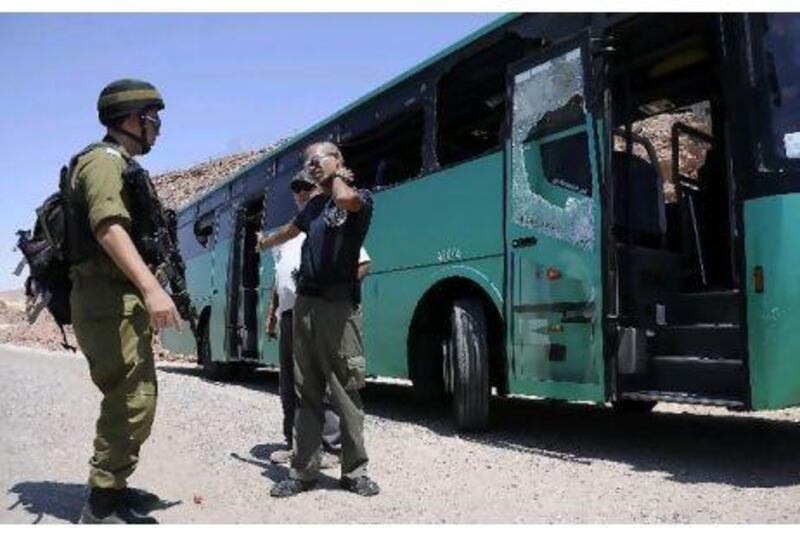TEL AVIV // At least seven people were killed and more than a dozen wounded yesterday in what appeared to be three coordinated attacks launched within a three-hour period on a bus, a private car and a military patrol in southern Israel.
Israeli officials said the attack, one of the boldest strikes in years against Israel, was carried out by a terror group that had infiltrated into Sinai from the Gaza Strip and that was tied to Hamas, the Islamic organisation that rules the enclave and that Israel considers an enemy.
The violence near the Red Sea resort town of Eilat stoked growing Israeli concern of Palestinian militants carrying out further attacks on the country's frontier with Egypt to exploit Egyptian instability following the removal of Hosni Mubarak as president in February.
Ehud Barak, Israel's defence minister, indicated that the attack may spur the Israeli military to launch a reprisal in Gaza. He was quoted in a statement from his office as saying: "This incident reflects a weakening of the Egyptian control over Sinai and an increase of terror acts there. The source of this terror act is in Gaza and we will act against them with full force and determination."
Hamas, however, denied involvement. Taher Nunu, a Hamas spokesman in Gaza, was quoted by the Associated Press as saying: "Gaza has nothing to do with these attacks in Eilat." In Egypt, state television showed the governor of north Sinai denying the attacks had come from the Egyptian side.
The incident also seemed to increase worries that violence between Israel and Palestinian militants may further escalate as the West Bank-based Palestinian Authority prepared to ask the UN next month to recognise its independent statehood.
The violence also appeared to at least momentarily take some pressure off Israeli Prime Minister Benjamin Netanyahu from the massive social and economic protests that have taken over the domestic media's attention in the past month.
The first assault took place at midday when attackers in a private car sprayed with automatic fire a packed bus carrying Israeli soldiers as it was making its way to Eilat, some 30 kilometres away. At least seven people were injured on the bus.
Israeli media reported that army and police forces, backed by two air force helicopters, pursued the suspected vehicle and after tracking it down engaged in a gun battle in which several of the militants were killed. Israeli television also reported that three bodies were booby-trapped. There was no word on whether any of the assailants had been captured alive.
Footage broadcast by Israeli television showed the green bus standing by a red, rocky cliff and surrounded by Israeli soldiers, with several windows and a door shattered. The reports also showed blood on some of the seats inside the bus and luggage scattered in its aisle.
About a half-hour after the bus assault, gunmen began firing on a private car several kilometres away, with a police spokesman saying the militants may have used mortars and an anti-tank missile. Less than an hour later, the reports said, an Israeli military patrol summoned to the scene drove over an explosive device that had been placed along the Israel-Egypt border. The Bedouin community that resides in Sinai is believed to have cooperated with militants in Gaza, which is just across the Egyptian border.
Yesterday's attack took place two weeks after gunmen assaulted part of an Egyptian-Israeli pipeline in Sinai, in the fifth such strike this year on energy infrastructure providing Egyptian natural gas to Israel.
Militants in Sinai have also distributed a leaflet in towns around the area calling for the establishment of the Islamic emirate of Sinai. There has been speculation that militants affiliated with Al Qaeda were in the region, although no conclusive link has so far been publicised.
Sinai is one of Egypt's least-developed areas and features the highest unemployment rate of any region in the country.
Last week, Egyptian security forces made a bid to battle militants in Sinai, dispatching hundreds of soldiers and police to the region in a campaign called Operation Eagle. At least 20 men had been arrested with materials that were reportedly to be used to attack the pipeline again and one man was killed.
Analysts say that Egyptian security forces have been trying to boost its cooperation with local Bedouins to help root out the militants.
"Sinai is an ideal environment for terrorism," said Bashir Abdel Fattah, an analyst who has studied the Sinai Bedouins at the Al Ahram Centre for Political and Strategic Studies in Cairo. "It is not well-patrolled by the army. It is a mountainous area where militants could easily hide from the police and the army."
Mr Abdel Fattah said that Egypt had also joined forces with Israel and the US to "get rid of this new Islamist threat living in Sinai", adding that it was a threat to the stability of Egypt.
Israeli government officials have expressed concern about being targeted by militants from Sinai after Mr Mubarak was toppled. Yesterday's strike was- likely to spur the country to step up the building of a security fence that would cover almost half of its porous 240-kilometre southern border with Sinai.
bhope@thenational.ae






